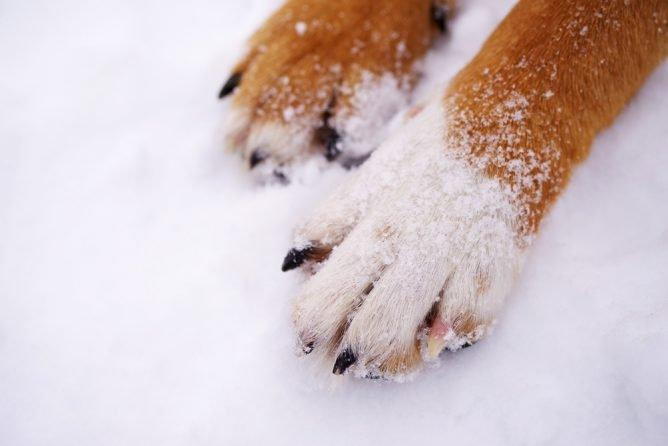Keep Your Dog's Paws Healthy This Winter!

- posted: Nov. 15, 2021
It's that time of year again in Regina, SK where the snow and ice have arrived and are likely to be staying! As we are out and about with our pets enjoying exercise via walks and outdoor play, here are some important tips from our team to keep your dog's paws in tip-top shape throughout winter.
After walking outside it is important to:
1) Rinse the paws to remove any residual salt and gravel- as people start salting and sanding their walkways, these compounds come in direct contact with your dog's paws. Rinsing after walking helps to remove larger sand particles and rinse away the salt- both of which can cause irritation and burning if left to sit on the skin.
2) Check for any cuts or cracks in the paw pads- ice can be sharp and slice the skin around the paw pads. The pads themselves can also crack if they become dry and cold. If you notice any cuts or abrasions, it is best to schedule an examination with one of our veterinarians to determine if further treatment is needed.
3) Keep long fur between the paw pads trimmed- keeping the long wisps trimmed can help reduce the trapping of unwanted snow and ice 'balls' that can build up in this fur.
4) Dry the paws well after rinsing- excess moisture can lead to an irritating dermatitis, it is important to dry them well afterwards!

- posted: Nov. 15, 2021
It's that time of year again in Regina, SK where the snow and ice have arrived and are likely to be staying! As we are out and about with our pets enjoying exercise via walks and outdoor play, here are some important tips from our team to keep your dog's paws in tip-top shape throughout winter.
After walking outside it is important to:
1) Rinse the paws to remove any residual salt and gravel- as people start salting and sanding their walkways, these compounds come in direct contact with your dog's paws. Rinsing after walking helps to remove larger sand particles and rinse away the salt- both of which can cause irritation and burning if left to sit on the skin.
2) Check for any cuts or cracks in the paw pads- ice can be sharp and slice the skin around the paw pads. The pads themselves can also crack if they become dry and cold. If you notice any cuts or abrasions, it is best to schedule an examination with one of our veterinarians to determine if further treatment is needed.
3) Keep long fur between the paw pads trimmed- keeping the long wisps trimmed can help reduce the trapping of unwanted snow and ice 'balls' that can build up in this fur.
4) Dry the paws well after rinsing- excess moisture can lead to an irritating dermatitis, it is important to dry them well afterwards!
Visit our Office
3259 Eastgate Drive
Regina, Saskatchewan S4Z1A4
